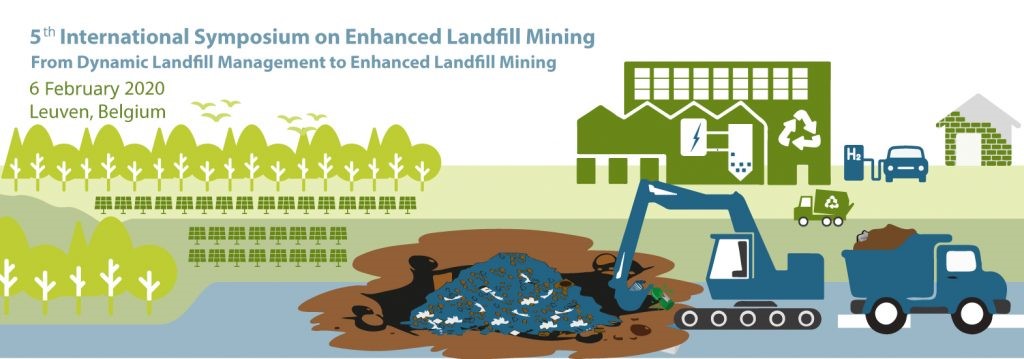Exactly 2 years after ELFM IV, the 5th International Symposium on Enhanced Landfill Mining (ELFM V) will take place in Leuven (Belgium) on February 6, 2020. The event will further develop the lessons learned from the previous symposium, ELFM IV organised in February 2018, and from the 2nd seminar on ELFM in the European parliament. It is a one-day event featuring a high-quality, “beyond-science-only” programme on Dynamic Landfill Management and Enhanced Landfill Mining. Registration is now open and free of charge for a maximum of 75 participants on a first come first served basis.
The fifth International Symposium on Enhanced Landfill Mining (ELFM V) is organised in Leuven (Belgium) on February 6, 2020, exactly 2 years after the previous ELFM symposium. The one-day event features a high-quality, “beyond-science-only” programme on Dynamic Landfill Management and Enhanced Landfill Mining (programme available here). ELFM V provides the floor to invited international experts, as well as the early-stage researchers from the ETN NEW-MINE project who will present their final results. The Symposium includes two interactive debates about how Europe is going to deal with its 500,000 landfills.
Registration is for free for a maximum of 75 participants on a first come first served basis.
The fifth symposium will further develop the lessons learned from the previous symposium, ELFM-IV organised in February 2018, and from the 2nd seminar on ELFM in the European parliament. The presentations of the ELFM-IV and a short video can be found on www.elfm.eu . The NEW-MINE project published two policy briefs after each event, summarizing the main conclusions of each event. Below the main lessons learned are repeated.

Policy brief “2nd ELFM Seminar in the European Parliament: 5 Lessons Learned – Why we need to develop a broad Dynamic Landfill Management strategy and vision for Europe’s 500,000 landfills”
- The ELFM Amendment of the Landfill Directive was rejected by the European Council in May 2017 as ELFM is a red line for the Eastern European Member States that have other, more pressing priorities in waste management, such as the avoidance of landfilling and the setting up of basic recycling schemes.
- The participants agreed that the (revised) EU Landfill Directive has a number of blind spots. It has no bearing on the majority of Europe’s 500,000 landfills as they predate the Directive (1999). As regards the minority of sanitary landfills, for which it was created, it has no answer for the longterm liabilities, as aftercare funds are underfunded, making any kind of future remediation and/or mining activity less attractive.
- There was a consensus that the way forward is to prioritise the incorporation of the more comprehensive, multi-phased concept of Dynamic Landfill Management into European legislation rather than focussing only on its most ambitious part, i.e. Enhanced Landfill Mining.
- It was agreed there is an urgent need for a comprehensive definition of the concept Dynamic Landfill Management (DLM), which should capture various dimensions. First of all, DLM refers to the dynamic view on landfill management, i.e. the management of any given landfill needs to smartly change and adjust over time. Secondly, DLM needs to offer an integrated framework, satisfying multiple objectives, ranging from pollution prevention, land reclamation and restoration, creation of new landfill void space, interim use of the landfill surface, to the recovery of materials and energy resources. Thirdly, a DLM definition needs to highlight the need for a cross-cutting approach with respect to distinct European policies and legislations. The task to develop a broadly-supported definition for DLM is given to the Interreg Europe COCOON team.
- It was agreed that Enhanced Landfill Mining (ELFM) remains a highly valuable concept, albeit as one specific, more advanced component within the broader DLM concept. The political acknowledgement of the resource recovery-driven ELFM concept remains relevant, in line with Europe’s Circular Economy Action Plan.
Policy brief “ELFM IV, February 2018: Six lessons learned”
- Enhanced Landfill Mining is grabbing a lot of attention, with three EU-funded projects underway. In addition, it provides the dual benefit of recovering valuable materials and freeing-up useful space in areas close to towns and cities.
- What stands in the way of large-scale ELFM? The main obstacles are market & technology barriers, legislative procedures and problems with social acceptance.
- ELFM is an emerging concept and relies upon novel technologies. Without support, it may never be able to take over from the incumbents. Society needs to be made fully aware of the situation, so that longterm solutions based on the best available information can be adopted.
- Financial considerations are holding back ELFM. Being able to reclaim land at the same time as reclaiming materials represents the best way to shift the economic balance. Another possibility is to target landfills in the developing world, as these are often devoid of sanitary technologies.
- ELFM is still a long way from being accepted by national policy makers. Unfortunately, the rejection of the European Parliament’s ELFM Amendment by the European Council means it will be some years before the idea of landfills being “dynamic resource stocks”, rather than “end stations” for obsolete waste, can be put on the agenda again.
- Social acceptance is a major barrier for ELFM. The solution is to educate and involve people, demonstrate the advantages and let them see the benefits.


